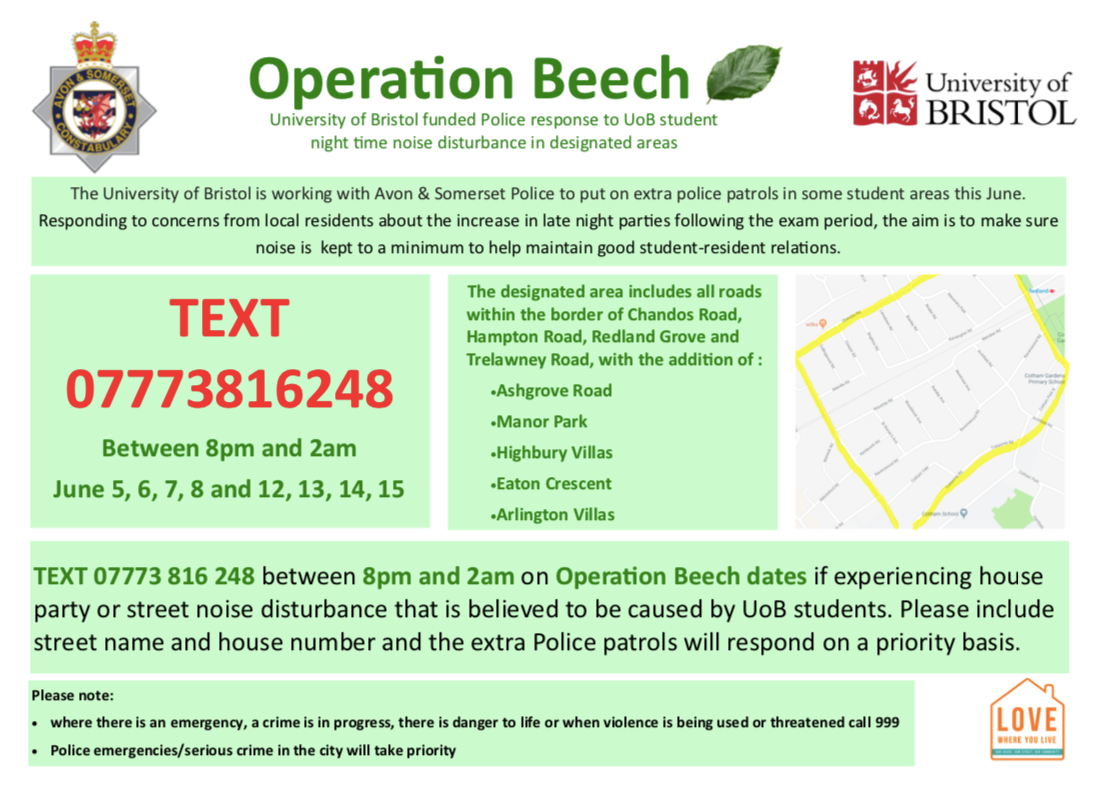By Teddy Coward, Investigations Editor
'Operation Beech' will allow local residents to report noisy student parties to on-patrol police.
The University of Bristol are to fund extra police during the period following exams. 'Operation Beech' will be made up of nightly patrols in Redland and Clifton from 8pm - 2am, between the 5 to 8 and 12 to 15 June.
Designated areas of patrols will encompass all roads within the border of Chandos Road, Hampton Road, Redland Gove and Trelawny Road. Other areas covered include: Ashgrove Road, Manor Park, Highburry Villas, Eaton Crescent and Arlington Villas.
The measures are modelled on a similar £50,000 operation, conducted by Newcastle and Northumbria universities last year and aim to minimise student noise and ‘help maintain good student-resident relations.’
The University has told Epigram that the patrols are designed to test systems and processes before they are rolled out fully in September. Other similar operations are planned for peak times in 2020.

Inspector Lorna Dallimore, of Avon and Somerset Police, said: 'When officers come across a noisy party or any associated anti-social behaviour, they will attempt to resolve the issue without taking further steps.
'We are not looking to criminalise young people or to stop them having fun, we are just reminding them to be respectful of other members of the community who they live alongside.
'Most students are usually very obliging when asked to turn music down, and we hope that our increased presence in the area over the exam period will have a positive effect.
'Noise related ASB is usually a matter dealt with by the council, but as most of the complaints are coming through at night, it was felt that we were best placed to be the first point of contact for these issues.'
Hmm. Really???!! Some of us have lived in Redland or Cotham before the yob students graced us with their presence..
— Victoria Coules (@victoriacoules) 18 October 2018
BBC News - Bristol University students face £100 noisy party finehttps://t.co/EuW0nZ1RvX
Diana Swain, Chandos Neighbourhood Association Chair, also spoke to Epigram about the plans, saying: 'About a year ago concern had grown in the neighbourhood about large parties (regularly 100-150 guests) which were happening.
'We were concerned for safety reasons, but also because of the noise and disturbance into the small hours for our residents.'
She also explained how local residents had made the University aware of a scheme in Newcastle on which Operation Beech is loosely based.
Ms Swain stated that she and other residents were optimistic that the measures would be effective in addressing the 'anti-social behaviour of the minority of students.'
However, students have not had such a positive response to the news. One student living on Hampton Road told Epigram: 'I don't think these measures will be effective - students need to let off steam and they will find a way to do that even with extra police. These measures will just foster bad relations with the University.'
Another first year student questioned the role that the University should have, saying: 'the houses now being policed are not rented from the University and they should not be getting involved.
‘It definitely seems like a waste of the University's money. I think the residents to some extent should accept it is a student area and understand from time to time it will be a bit loud. This scheme could ruin a lot of student’s lives as I imagine a lot more arrests will be made.’
I used to live in Redland as a student and one year someone threw a party and one of the local residents literally walked in and switched off their fuse box to disperse it. The Chandos Community take these things VERY seriously.
— Chloe Maughan (@cleo_writes) 11 October 2018
A University spokesperson explained that the areas designated for Operation Beech are those that 'consistently see a disproportionate level of student-related noise disturbance and anti-social house parties'.
They said: 'We take great pride in the value our students bring to the community, but also recognise the impact of high-density student populations in local residential areas, especially if they make noise during the night.
'The University takes very seriously its responsibility to be a good neighbour and manage the impact of our students on the community. We acknowledge that public services are stretched, so where our students are causing distress to local residents, we should contribute to resourcing that management.
'Any students who are found to be making excessive noise that causes inconvenience to local residents could face appropriate action from the Police or Bristol City Council’s Neighbourhood Enforcement Team as would any other private citizen. They could also be disciplined under student disciplinary rules and procedures.
'We have a dedicated community liaison manager who works closely with local resident and community groups. We actively support our students to prepare for the transition into private rented accommodation, regularly providing them with information on community living, including how to be considerate neighbours.'
Featured Image: Epigram / Tom Taylor
Will the measures put students off having parties after exams? Let us know what you think!







